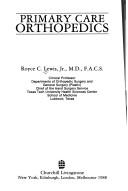| Listing 1 - 10 of 912 | << page >> |
Sort by
|
Book
ISBN: 9783031684067 Year: 2024 Publisher: Cham : Springer Nature Switzerland : Imprint: Springer,
Abstract | Keywords | Export | Availability | Bookmark
 Loading...
Loading...Choose an application
- Reference Manager
- EndNote
- RefWorks (Direct export to RefWorks)
This manual describes the issues of diagnosing and managing skin diseases relevant to primary care, where the vast majority of dermatology patients are initially investigated. In most circumstances, primary care physicians need to assess and diagnose skin conditions without the aid of any laboratory or other diagnostic tests. Given that dermatological training for primary care providers is limited, this can make it challenging to diagnose skin diseases accurately, more so for those in the early stages of their career. The Manual of Primary Care Dermatology is written by a dermatologically trained practicing primary care physician to address the issues in managing skin diseases in primary care medicine. It provides readers with practical guidance on the differential diagnosis of skin diseases. The anatomical approach presented makes it easy for the reader to manage their patients' skin condition. With chapters dedicated to lesions of the scalp, face or upper extremity, it represents a quick reference book even for a busy practitioner. It is therefore essential reading for all primary care physicians and dermatologists looking for a compact reference to the differential diagnosis of all skin diseases.
Dermatology. --- Primary care (Medicine). --- Primary Care Medicine. --- Primary care (Medicine)
Book
ISBN: 9783031485695 Year: 2024 Publisher: Cham : Springer International Publishing : Imprint: Springer,
Abstract | Keywords | Export | Availability | Bookmark
 Loading...
Loading...Choose an application
- Reference Manager
- EndNote
- RefWorks (Direct export to RefWorks)
This book offers a comprehensive overview of common medical conditions that present in women's primary care clinics. Medical conditions often present differently in women than they do in men and as a result, primary care providers should be familiar with how to identify and treat these conditions. This book provides a collection of common medical conditions and aims to educate the reader on how to approach and manage such conditions. Chapters cover non-infection conditions, infectious conditions, and health maintenance in women. Common Cases in Women's Primary Care Clinics will be a valuable resource for primary care providers, internists, family practitioners, nurse practitioners, physical assistants, medical students, and other physicians interested in women's primary care conditions. .
Gynecology. --- Primary care (Medicine). --- Primary Care Medicine.

ISBN: 0387965459 Year: 1987 Publisher: New York (N.Y.): Springer
Abstract | Keywords | Export | Availability | Bookmark
 Loading...
Loading...Choose an application
- Reference Manager
- EndNote
- RefWorks (Direct export to RefWorks)

ISBN: 0443083568 Year: 1988 Publisher: New York (N.Y.): Livingstone
Abstract | Keywords | Export | Availability | Bookmark
 Loading...
Loading...Choose an application
- Reference Manager
- EndNote
- RefWorks (Direct export to RefWorks)
Book
Year: 1998 Publisher: Philadelphia ; London ; Toronto Saunders
Abstract | Keywords | Export | Availability | Bookmark
 Loading...
Loading...Choose an application
- Reference Manager
- EndNote
- RefWorks (Direct export to RefWorks)
Book
Year: 2014 Publisher: Oslo : Norwegian Knowledge Centre for the Health Services,
Abstract | Keywords | Export | Availability | Bookmark
 Loading...
Loading...Choose an application
- Reference Manager
- EndNote
- RefWorks (Direct export to RefWorks)
The prognosis for children with serious somatic illness is better today than a decade ago and more children are living with chronic disease. However, studies have shown that children with serious somatic illness have a two or three times greater risk of developing mental, social or family problems than healthy children. It is important to identify interventions that may improve mental health in children with severe somatic illness. This overview of systematic reviews presents findings from systematic reviews of high quality, which summarizes the results on the efficacy of psychological interventions provided in primary care for children with severe somatic illness. We included ten systematic reviews presenting results from 21 primary studies relevant to our problem. The studies primarily dealt with psychological interventions for children with asthma and diabetes. The documentation shows that:1. Conclusions could not be drawn about the effect of psychological interventions provided by professionals in primary care on mental health conditions such as anxiety, depression, quality of life, coping and psychosocial function for children with serious somatic illness.2. A meta-analysis of four studies of children with type 1 diabetes showed that psychological interventions such as cognitive behavioral therapy, support and counseling by psychologist and family systems therapy might possibly contribute to better mental health. In general, the results from the included studies did not show any statistically significant difference between the differing interventions. One should however, not assume that no documentation of difference equates to documenting that there is no difference. Most of the studies had few participants and large variations.
Book
Year: 2014 Publisher: Rockville, MD : Agency for Healthcare Research and Quality,
Abstract | Keywords | Export | Availability | Bookmark
 Loading...
Loading...Choose an application
- Reference Manager
- EndNote
- RefWorks (Direct export to RefWorks)
Book
Year: 2013 Publisher: London : National Institute for Health and Care Excellence,
Abstract | Keywords | Export | Availability | Bookmark
 Loading...
Loading...Choose an application
- Reference Manager
- EndNote
- RefWorks (Direct export to RefWorks)
This clinical guideline covers the management of neuropathic pain conditions in adults (aged 18 or over) in primary care and secondary care, excluding specialist pain management clinics. The aim of the guideline is to provide clear recommendations to healthcare professionals in non-specialist settings on the treatment and management of neuropathic pain. This includes recommendations on appropriate and timely referral to specialist pain services and/or condition-specific services. In general, regarding neuropathic pain as a blanket condition, irrespective of the underlying cause, is helpful and practical for both non-specialist healthcare professionals and patients. However, condition-specific recommendations and research recommendations have been made where robust evidence on clinical and cost effectiveness exists for specific conditions, or where the evidence is clearly uncertain. The guideline excludes acute pain arising directly (in the first 3 months) from trauma or orthopaedic surgical procedures.
Book
Year: 2013 Publisher: London : National Institute for Health and Care Excellence,
Abstract | Keywords | Export | Availability | Bookmark
 Loading...
Loading...Choose an application
- Reference Manager
- EndNote
- RefWorks (Direct export to RefWorks)
This clinical guideline covers the management of neuropathic pain conditions in adults (aged 18 or over) in primary care and secondary care, excluding specialist pain management clinics. The aim of the guideline is to provide clear recommendations to healthcare professionals in non-specialist settings on the treatment and management of neuropathic pain. This includes recommendations on appropriate and timely referral to specialist pain services and/or condition-specific services. In general, regarding neuropathic pain as a blanket condition, irrespective of the underlying cause, is helpful and practical for both non-specialist healthcare professionals and patients. However, condition-specific recommendations and research recommendations have been made where robust evidence on clinical and cost effectiveness exists for specific conditions, or where the evidence is clearly uncertain. The guideline excludes acute pain arising directly (in the first 3 months) from trauma or orthopaedic surgical procedures.
Book
Year: 2014 Publisher: Oslo : Norwegian Knowledge Centre for the Health Services,
Abstract | Keywords | Export | Availability | Bookmark
 Loading...
Loading...Choose an application
- Reference Manager
- EndNote
- RefWorks (Direct export to RefWorks)
The prognosis for children with serious somatic illness is better today than a decade ago and more children are living with chronic disease. However, studies have shown that children with serious somatic illness have a two or three times greater risk of developing mental, social or family problems than healthy children. It is important to identify interventions that may improve mental health in children with severe somatic illness. This overview of systematic reviews presents findings from systematic reviews of high quality, which summarizes the results on the efficacy of psychological interventions provided in primary care for children with severe somatic illness. We included ten systematic reviews presenting results from 21 primary studies relevant to our problem. The studies primarily dealt with psychological interventions for children with asthma and diabetes. The documentation shows that:1. Conclusions could not be drawn about the effect of psychological interventions provided by professionals in primary care on mental health conditions such as anxiety, depression, quality of life, coping and psychosocial function for children with serious somatic illness.2. A meta-analysis of four studies of children with type 1 diabetes showed that psychological interventions such as cognitive behavioral therapy, support and counseling by psychologist and family systems therapy might possibly contribute to better mental health. In general, the results from the included studies did not show any statistically significant difference between the differing interventions. One should however, not assume that no documentation of difference equates to documenting that there is no difference. Most of the studies had few participants and large variations.
| Listing 1 - 10 of 912 | << page >> |
Sort by
|

 Search
Search Feedback
Feedback About UniCat
About UniCat  Help
Help News
News